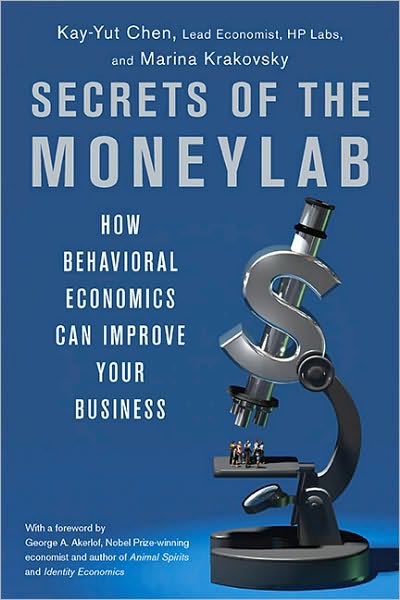I have been a fan of Marina Krakovsky - the co-author of the book - since 1995 when her ground breaking book on Oracle was published, and has been following her work since than.
That said, I was a bit intimidated by this book since the main author proclaims himself to be the lead economist and appeared to a PhD type. Also, the book cover has a "S" stuck on a microscope - this looks very clever on the small resolution image on the website, making it look like a dollar symbol; but when the actual book arrived, the high resoluton image looked more like, Ummm, just a S stuck on a microscope.
However, Once I got over my fear and started reading the book, I found it to be an interesting and useful read.
Chapters on fairness, reciprocity, reputation and trust can be very useful for a small business owner - for example, it was interesting to learn about the study where they found that fairness is so important to people that most people will choose to get nothing vs. get what they consider an unfair share. On the other side, most people will actually offer 70-30 or 60-40 to others (when both have to do nothing to earn it) even when they did not have to. This series of examples demonstrates that there is both a sense and an expectation of fairness in humans. This is something we all know, but this is the first quantification I have seen on the "spread" - i.e. perception of an even split Vs. 70 - 30, 60-40 or even 99 - 1 as being fair or unfair (when neither side have to do anything to earn it).
Similarly, there is an excellent example from Mattel on how a chain of trust - where Mattel trusted a long time supplier who trusted a friend for supplying a paint pigment - could lead to disaster when the trust down the chain is misplaced. In this case, the friend of the supplier provided a paint which contained lead.
And I liked the examples on reciprocity.
The nice thing is that you don't need a background in statistics, economics of mathematics to understand this book.
On the flip side, the authors have tried to dumb down the book a bit too much as places - for example, they give an elaborate table illustrating changing payoffs on page 14 - where payoffs and probability changes are tabulated between two scenarios - this was a bit of an overkill. I would not draw such a table even when I was explaining the concept to my 10 year old. Similarly, I did not care for the mundane example where Marina insisted on upfront payment for writing a column for a foreign publisher (So?)
But such cases were the exceptions, not the rule - most examples were insightful. Overall, a useful book.
Buy Secrets of the Moneylab Hardcover Kindle Edition Audiobook CD
That said, I was a bit intimidated by this book since the main author proclaims himself to be the lead economist and appeared to a PhD type. Also, the book cover has a "S" stuck on a microscope - this looks very clever on the small resolution image on the website, making it look like a dollar symbol; but when the actual book arrived, the high resoluton image looked more like, Ummm, just a S stuck on a microscope.
However, Once I got over my fear and started reading the book, I found it to be an interesting and useful read.
Chapters on fairness, reciprocity, reputation and trust can be very useful for a small business owner - for example, it was interesting to learn about the study where they found that fairness is so important to people that most people will choose to get nothing vs. get what they consider an unfair share. On the other side, most people will actually offer 70-30 or 60-40 to others (when both have to do nothing to earn it) even when they did not have to. This series of examples demonstrates that there is both a sense and an expectation of fairness in humans. This is something we all know, but this is the first quantification I have seen on the "spread" - i.e. perception of an even split Vs. 70 - 30, 60-40 or even 99 - 1 as being fair or unfair (when neither side have to do anything to earn it).
Similarly, there is an excellent example from Mattel on how a chain of trust - where Mattel trusted a long time supplier who trusted a friend for supplying a paint pigment - could lead to disaster when the trust down the chain is misplaced. In this case, the friend of the supplier provided a paint which contained lead.
And I liked the examples on reciprocity.
The nice thing is that you don't need a background in statistics, economics of mathematics to understand this book.
On the flip side, the authors have tried to dumb down the book a bit too much as places - for example, they give an elaborate table illustrating changing payoffs on page 14 - where payoffs and probability changes are tabulated between two scenarios - this was a bit of an overkill. I would not draw such a table even when I was explaining the concept to my 10 year old. Similarly, I did not care for the mundane example where Marina insisted on upfront payment for writing a column for a foreign publisher (So?)
But such cases were the exceptions, not the rule - most examples were insightful. Overall, a useful book.
Buy Secrets of the Moneylab Hardcover Kindle Edition Audiobook CD


No comments:
Post a Comment